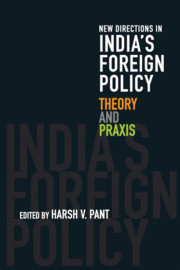Book contents
- Frontmatter
- Contents
- Preface
- 1 Introduction
- Part I Theoretical Evolution
- 2 Power and Indian Foreign Policy
- 3 Constructivism and Indian Foreign Policy
- 4 Exploring Historical Memory and Indian Foreign Policy
- 5 A Doubled Geography: Geobody, Land and Sea in Indian Security Thought
- 6 Foreign Policy Analysis and Indian Foreign Policy
- Part II Emerging Themes
- Bibliography
- Contributors
- Index
4 - Exploring Historical Memory and Indian Foreign Policy
from Part I - Theoretical Evolution
Published online by Cambridge University Press: 13 November 2018
- Frontmatter
- Contents
- Preface
- 1 Introduction
- Part I Theoretical Evolution
- 2 Power and Indian Foreign Policy
- 3 Constructivism and Indian Foreign Policy
- 4 Exploring Historical Memory and Indian Foreign Policy
- 5 A Doubled Geography: Geobody, Land and Sea in Indian Security Thought
- 6 Foreign Policy Analysis and Indian Foreign Policy
- Part II Emerging Themes
- Bibliography
- Contributors
- Index
Summary
In 2015, it was claimed that the India–UK bilateral relationship is affected by ‘a colonial mind set’ that has led to a ‘growing disconnect’ between the two nations. Correspondingly, the UK dropped from being India's third largest trading partner in 2000 to its twelfth largest in 2015. There are many factors that one could point to for the cool bilateral relationship, including as has been suggested, India's rise, which implies that India's need for a strong bilateral relationship is less than the UK's. But another, somewhat overlooked, factor is the historical relationship between the two as colonizer and colony, which continues to crop up in the relationship.
In 2013, for example, when British Prime Minister David Cameron visited India, the Indian media and public avidly discussed whether he would formally apologise for the Jallianwala Bagh massacre of 1919. This incident in which hundreds of innocent Indian citizens were shot dead on the orders of British Brigadier-General Reginald Dyer is seen as a symbol of the brutalities committed during the two hundred years of British colonial rule in India. When Mr Cameron visited the site, and expressed regret for the ‘shameful event’, he was strongly condemned for his half-hearted response. In July 2015, Congress Member of Parliament, Shashi Tharoor, in a speech to the Oxford Union Society that quickly went viral and earned the praise of Prime Minister Narendra Modi, declared that Britain should financially and symbolically compensate India for its colonial rule:
By the end of (the) nineteenth century, the fact is that India was already Britain's biggest cash cow – the world's biggest purchaser of British goods and exports and the source for highly paid employment for British civil servants. We literally paid for our own oppression. Colonialists like Robert Clive brought their rotten boroughs in England on the proceeds of their loot in India while taking the Hindi word loot into their dictionary as well as their habits. And the British had the gall to call him Clive of India as if he belonged to the country, when all he really did was to ensure that much of the country belonged to him.
In November 2015, a lobby group of Indian businessmen and Bollywood celebrities declared they would legally challenge the British monarchy's possession of the valuable Kohinoor diamond.
- Type
- Chapter
- Information
- New Directions in India's Foreign PolicyTheory and Praxis, pp. 67 - 84Publisher: Cambridge University PressPrint publication year: 2019



